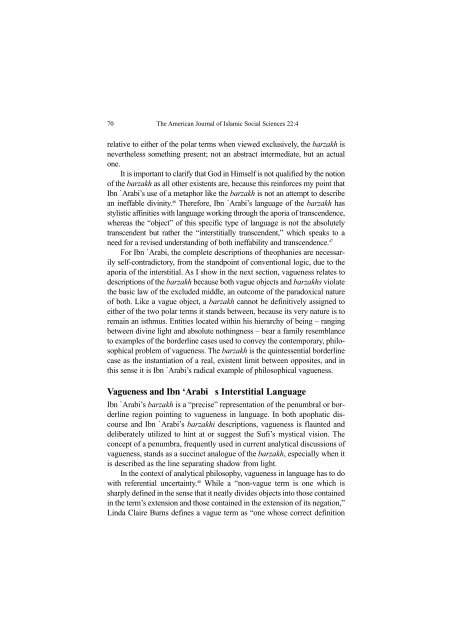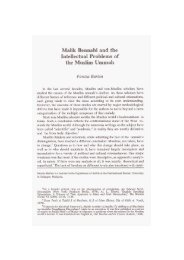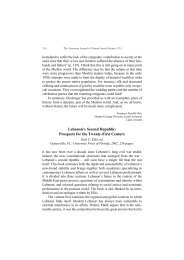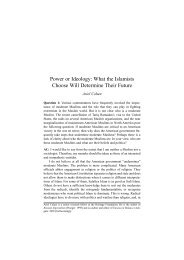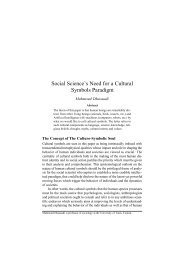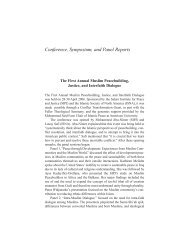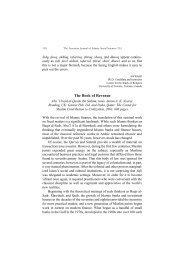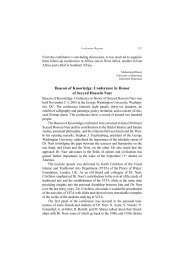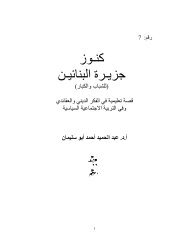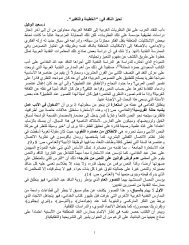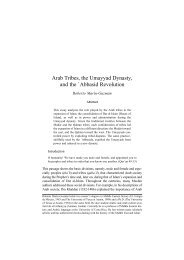Vagueness: An Additional Nuance in the ... - I-Epistemology
Vagueness: An Additional Nuance in the ... - I-Epistemology
Vagueness: An Additional Nuance in the ... - I-Epistemology
Create successful ePaper yourself
Turn your PDF publications into a flip-book with our unique Google optimized e-Paper software.
70 The American Journal of Islamic Social Sciences 22:4<br />
relative to ei<strong>the</strong>r of <strong>the</strong> polar terms when viewed exclusively, <strong>the</strong> barzakh is<br />
never<strong>the</strong>less someth<strong>in</strong>g present; not an abstract <strong>in</strong>termediate, but an actual<br />
one.<br />
It is important to clarify that God <strong>in</strong> Himself is not qualified by <strong>the</strong> notion<br />
of <strong>the</strong> barzakh as all o<strong>the</strong>r existents are, because this re<strong>in</strong>forces my po<strong>in</strong>t that<br />
Ibn `Arabi’s use of a metaphor like <strong>the</strong> barzakh is not an attempt to describe<br />
an <strong>in</strong>effable div<strong>in</strong>ity. 46 Therefore, Ibn `Arabi’s language of <strong>the</strong> barzakh has<br />
stylistic aff<strong>in</strong>ities with language work<strong>in</strong>g through <strong>the</strong> aporia of transcendence,<br />
whereas <strong>the</strong> “object” of this specific type of language is not <strong>the</strong> absolutely<br />
transcendent but ra<strong>the</strong>r <strong>the</strong> “<strong>in</strong>terstitially transcendent,” which speaks to a<br />
need for a revised understand<strong>in</strong>g of both <strong>in</strong>effability and transcendence. 47<br />
For Ibn `Arabi, <strong>the</strong> complete descriptions of <strong>the</strong>ophanies are necessarily<br />
self-contradictory, from <strong>the</strong> standpo<strong>in</strong>t of conventional logic, due to <strong>the</strong><br />
aporia of <strong>the</strong> <strong>in</strong>terstitial. As I show <strong>in</strong> <strong>the</strong> next section, vagueness relates to<br />
descriptions of <strong>the</strong> barzakh because both vague objects and barzakhs violate<br />
<strong>the</strong> basic law of <strong>the</strong> excluded middle, an outcome of <strong>the</strong> paradoxical nature<br />
of both. Like a vague object, a barzakh cannot be def<strong>in</strong>itively assigned to<br />
ei<strong>the</strong>r of <strong>the</strong> two polar terms it stands between, because its very nature is to<br />
rema<strong>in</strong> an isthmus. Entities located with<strong>in</strong> his hierarchy of be<strong>in</strong>g – rang<strong>in</strong>g<br />
between div<strong>in</strong>e light and absolute noth<strong>in</strong>gness – bear a family resemblance<br />
to examples of <strong>the</strong> borderl<strong>in</strong>e cases used to convey <strong>the</strong> contemporary, philosophical<br />
problem of vagueness. The barzakh is <strong>the</strong> qu<strong>in</strong>tessential borderl<strong>in</strong>e<br />
case as <strong>the</strong> <strong>in</strong>stantiation of a real, existent limit between opposites, and <strong>in</strong><br />
this sense it is Ibn `Arabi’s radical example of philosophical vagueness.<br />
<strong>Vagueness</strong> and Ibn ‘Arabi s Interstitial Language<br />
Ibn `Arabi’s barzakh is a “precise” representation of <strong>the</strong> penumbral or borderl<strong>in</strong>e<br />
region po<strong>in</strong>t<strong>in</strong>g to vagueness <strong>in</strong> language. In both apophatic discourse<br />
and Ibn `Arabi’s barzakhi descriptions, vagueness is flaunted and<br />
deliberately utilized to h<strong>in</strong>t at or suggest <strong>the</strong> Sufi’s mystical vision. The<br />
concept of a penumbra, frequently used <strong>in</strong> current analytical discussions of<br />
vagueness, stands as a succ<strong>in</strong>ct analogue of <strong>the</strong> barzakh, especially when it<br />
is described as <strong>the</strong> l<strong>in</strong>e separat<strong>in</strong>g shadow from light.<br />
In <strong>the</strong> context of analytical philosophy, vagueness <strong>in</strong> language has to do<br />
with referential uncerta<strong>in</strong>ty. 48 While a “non-vague term is one which is<br />
sharply def<strong>in</strong>ed <strong>in</strong> <strong>the</strong> sense that it neatly divides objects <strong>in</strong>to those conta<strong>in</strong>ed<br />
<strong>in</strong> <strong>the</strong> term’s extension and those conta<strong>in</strong>ed <strong>in</strong> <strong>the</strong> extension of its negation,”<br />
L<strong>in</strong>da Claire Burns def<strong>in</strong>es a vague term as “one whose correct def<strong>in</strong>ition


